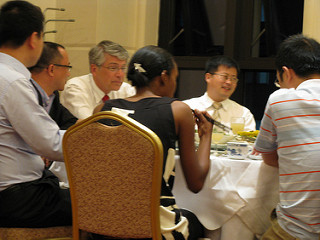 Finding an Interpreter is similar to finding a doctor or lawyer. Imagine walking up to someone and telling them, “I need a lawyer!” Most likely the response would be another question such as “What kind of lawyer? If you were to reply, “No I need a lawyer, any lawyer,” there would be a problem. Why? Because lawyers have practice areas. Is it criminal defense, family law or workers’ comp? Selecting the right attorney who specializes in the type of issue you are dealing with is critical.
Finding an Interpreter is similar to finding a doctor or lawyer. Imagine walking up to someone and telling them, “I need a lawyer!” Most likely the response would be another question such as “What kind of lawyer? If you were to reply, “No I need a lawyer, any lawyer,” there would be a problem. Why? Because lawyers have practice areas. Is it criminal defense, family law or workers’ comp? Selecting the right attorney who specializes in the type of issue you are dealing with is critical.
Likewise,you would not want to see an orthopedic doctor if you have cancer. Patients want to find the best professional to insure the best possible chance of success.
[spacer height=”20px”
]This same principle applies to interpreters. Just like any profession, most interpreters specialize. Some of the more common types are medical, legal, community, liaison, and conference interpreters. Many skilled, experienced interpreters have developed more than one specialty. So what is the difference between a conference interpreter and a liaison interpreter?
Conference Interpreters:
- Highly skilled interpreters
- This expertise requires the interpreter to listen and process the information while almost simultaneously speaking. This is incredibly difficult and must flow naturally in order for event attendees to enjoy themselves.
- Familiarity with simultaneous equipment
- Many multilingual events are set up with booths where the interpreters can observe the speaker and use equipment to hear the speaker and transmit the message to the attendees who use receivers to listen.
- Equipment can at times have technical difficulties. Experienced conference interpreters are typically better prepared to handle these difficult situations when they arise. They also recognize the necessity of having a technician who can save the day.
- Excellent tool for group presentations
- They contribute to an efficient and enjoyable event for listeners.
- Interpreters are usually heard and not seen.
Liaison Interpreters:
- Excellent consecutive interpreters.
- They frequently accompany an individual lacking fluency in the country they are visiting.
- They serve the added role of cultural guide helping to bridge communication gaps and explaining customs and cultural differences.
- They are capable in providing discreet and tactful communication on a personal level between individuals.
- They allow individuals to benefit and enjoy communication on a personal level while they are visiting.
- They normally accompany the guest needing interpretation but are skilled at being unobtrusive so as not to draw attention to themselves.
When planning multilingual events, clients may desire both services. The conference interpreting team will assure that foreign language delegate benefit from the sessions while the liaison interpreter will assure that guest will enjoy friendly or business conversations while mingling at the event.





Pingback: Conference or Liaison Interpreter: What’s...